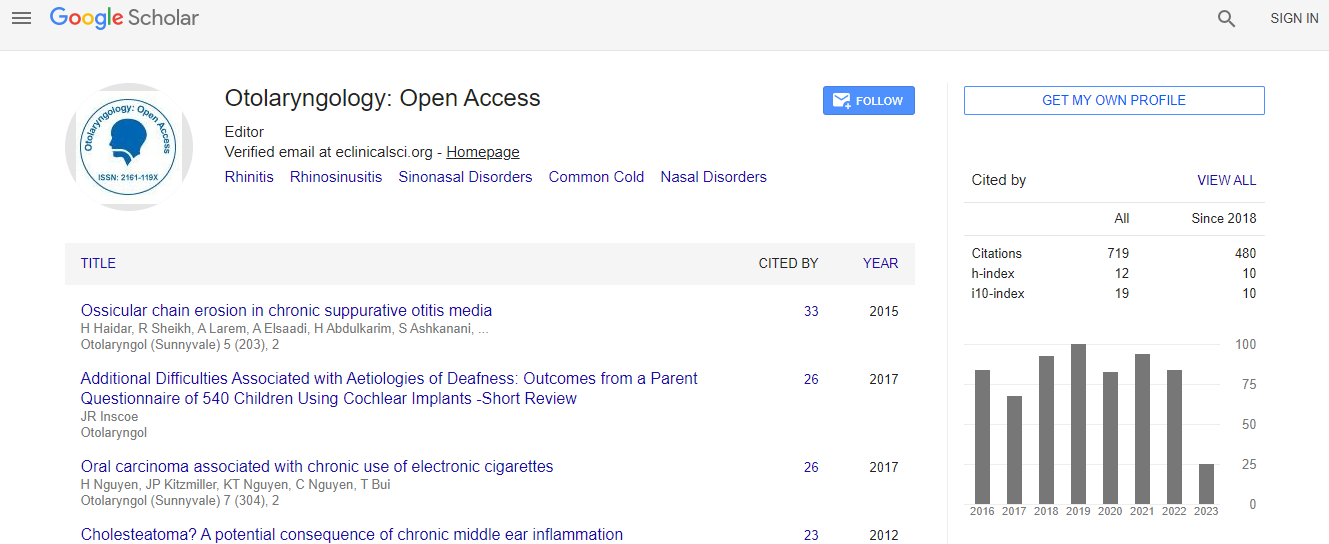Our Group organises 3000+ Global Conferenceseries Events every year across USA, Europe & Asia with support from 1000 more scientific Societies and Publishes 700+ Open Access Journals which contains over 50000 eminent personalities, reputed scientists as editorial board members.
Open Access Journals gaining more Readers and Citations
700 Journals and 15,000,000 Readers Each Journal is getting 25,000+ Readers
Google Scholar citation report
Citations : 925
Otolaryngology: Open Access received 925 citations as per Google Scholar report
Otolaryngology: Open Access peer review process verified at publons
Indexed In
- Index Copernicus
- Google Scholar
- Sherpa Romeo
- Open J Gate
- Genamics JournalSeek
- RefSeek
- Hamdard University
- EBSCO A-Z
- OCLC- WorldCat
- Publons
- Geneva Foundation for Medical Education and Research
- ICMJE
Useful Links
Recommended Journals
Related Subjects
Share This Page
Number processing and arithmetic in hearing impaired children
International Conference and Exhibition on Otolaryngology
J. Geibler, S. Pixner, K. Moeller and L. Kaufmann
ScientificTracks Abstracts: Otolaryngology
Abstract
The current study aims to investigate number processing and arithmetic skills in hearing impaired children and adolescents. The testing series consisted of various number tasks thought to be more or less dependent on language processing (e.g., enumeration, symbolic and non-symbolic number comparison, number line placements, written and verbal counting, arithmetic fact retrieval and written calculation). Overall, fifty children and adolescents aged 8;2 to 18;6 years participated in the present study (there of n=25 healthy control participants without hearing impairment). Our working hypotheses were as follows: compared with controls participants with hearing impairments should perform worse on verbally mediated number tasks (thought to heavily depend on linguistic processing components) while both groups should display comparable performance levels on number tasks thought to be less dependent on language demands (that primarily tap quantitative processing components). Indeed, results are consistent with our working hypotheses, revealing significant group differences on verbally-based number tasks but comparable performance levels on non-verbal number tasks. Furthermore, individuals with hearing impairment were found to have difficulties to map Arabic symbols to their corresponding magnitudes. It is plausible to speculate that the latter mapping difficulties may have substantially contributed to performance deficiencies on other number tasks. Taken together, our findings stress the importance of systematic examinations of number skills that are apt to disentangle different processing components (e.g., linguistic, quantitative) contributing to number processing. The need to further differentiate number tasks depending on their language reliance becomes especially obvious in our study group of hearing impaired individuals known to have associated language impairments which in turn may have rather differential effects on their numerical development as well.Biography
Judith Geissler has completed her Master in Psycholinguistics in 2003 at the Ludwig-Maximilians-University Munich. Subsequently she studied Psychology at the Paris-London University in Salzburg receiving her Diploma in 2009. Since 2003 she is working with deaf and hearing impaired children and adolescents. After having accomplished her studies in Psychology (majoring in psychological diagnostics) she is now lecturing at the Department of Psychology at the Paris-Londron University in Salzburg (course title: Diagnostic applications in psychology: Performance and pe rsonality).

 Spanish
Spanish  Chinese
Chinese  Russian
Russian  German
German  French
French  Japanese
Japanese  Portuguese
Portuguese  Hindi
Hindi 
